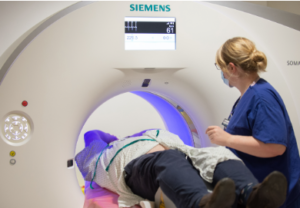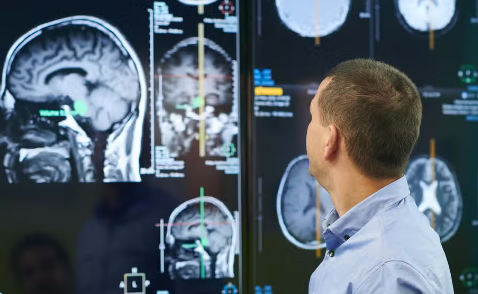EDINBURGH — August 26, 2024 — A team of researchers in Scotland is pioneering a groundbreaking study to predict dementia risk by analyzing over 1.6 million brain scans using artificial intelligence (AI). This large-scale project, involving experts from the universities of Edinburgh and Dundee, represents a significant step forward in early dementia detection and treatment.
AI and Brain Scans: A New Frontier in Dementia Research
The project, named Scan-Dan (Scottish AI in Neuroimaging to predict Dementia and Neurodegenerative Disease), aims to identify patterns in the brain that signal the early stages of dementia. The research team has been granted access to an unprecedented dataset of anonymized CT and MRI scans collected across Scotland between 2008 and 2018.
Unprecedented Access to Data
NHS Scotland provided the data with the approval of the Public Benefit and Privacy Panel for Health and Social Care, ensuring strict adherence to privacy standards. This marks the first time such a vast number of brain scans has been made available for dementia research in the UK, offering scientists a unique opportunity to advance our understanding of the disease.
The Importance of Early Detection
Early detection is key in the fight against dementia, particularly Alzheimer’s disease, which is characterized by the accumulation of harmful proteins in the brain. These changes often begin long before symptoms appear. By identifying at-risk individuals early, the research could lead to interventions that slow the progression of the disease.
Former journalist Willy Gilder, diagnosed with Alzheimer’s three years ago, underscores the value of early diagnosis. “Knowing my risk allowed me to make changes that help improve my brain health,” said the 71-year-old Edinburgh resident.

Potential Breakthroughs in Dementia Treatment
The project also has significant implications for the development of new treatments. “Currently, treatments for dementia are limited, costly, and often of uncertain value,” said Prof. Will Whiteley, co-leader of the project at Edinburgh University’s Centre for Clinical Brain Sciences. “By collecting data from those at high risk, we can better target clinical trials and develop more effective therapies.”
What’s Next?
The research team expects to have initial results by early next year, with hopes that the AI-driven analysis will eventually lead to a practical diagnostic tool. Prof. Emanuele Trucco, an expert in AI and medical imaging at Dundee University, remains optimistic: “With such a large dataset, we are confident in our ability to predict dementia risk and pave the way for earlier and more effective interventions.”
This ambitious project positions Scotland as a leader in the global effort to combat dementia, offering hope to millions affected by the disease worldwide.
Background: The Growing Challenge of Dementia
Dementia, including Alzheimer’s disease, is one of the most significant health challenges of our time. The World Health Organization estimates that over 55 million people worldwide are living with dementia, a number expected to rise as populations age. Despite extensive research, effective treatments remain limited, making early detection and intervention crucial.
The Role of Brain Scans in Dementia Research
Brain imaging, including CT (Computed Tomography) and MRI (Magnetic Resonance Imaging), has become an essential tool in studying neurodegenerative diseases like dementia. These scans allow scientists to observe structural and functional changes in the brain that may indicate the onset of dementia. However, the ability to analyze such data at scale has been limited—until now.

Scan-Dan Project: A Pioneering Approach
The Scan-Dan project is part of a larger global initiative called NEURii, focused on using AI to advance neuroimaging research. The Scottish researchers’ access to over 1.6 million anonymized brain scans is unprecedented. These scans, collected over ten years from routine clinical care, represent a broad cross-section of the Scottish population, providing a diverse and comprehensive dataset for analysis.
Why Artificial Intelligence?
AI is particularly well-suited to analyze large datasets like the one in the Scan-Dan project. By applying machine learning algorithms to the brain scans, researchers can identify subtle patterns and changes that might be missed by the human eye. These patterns could indicate early signs of dementia, long before cognitive symptoms appear.
Prof. Emanuele Trucco, a leader in AI and medical imaging, highlights that while the researchers don’t know exactly what they will find, the sheer volume of data increases the likelihood of discovering meaningful patterns. This approach could revolutionize how we predict and diagnose dementia.
Ethical Considerations and Data Privacy
Given the sensitive nature of health data, the Scan-Dan project has undergone rigorous ethical review. NHS Scotland’s Public Benefit and Privacy Panel for Health and Social Care carefully evaluated the project, ensuring that all patient data is fully anonymized and that the research meets strict privacy and confidentiality standards.
This level of scrutiny is vital to maintain public trust, especially as the use of AI and large datasets in healthcare becomes more common.
Potential Impact on Healthcare
The implications of this research are vast:
- Early Diagnosis: The ability to predict dementia risk years before symptoms appear could lead to earlier interventions, potentially slowing the disease’s progression. This would be a significant advancement, as current treatments are most effective in the early stages of dementia.
- Personalized Medicine: Understanding individual risk factors could lead to more personalized approaches to treatment and prevention, tailored to a patient’s unique brain profile.
- Resource Allocation: Early detection could also help healthcare systems better allocate resources, focusing on preventive care and targeted interventions for those at highest risk.






